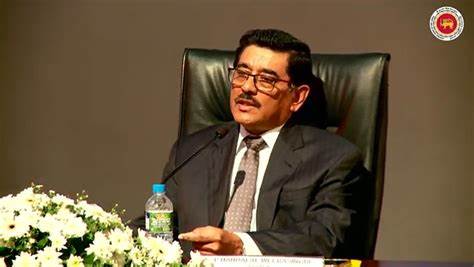
No need to raise funds from global debt markets even in 2028: CB Governor
- CNL Reporter
- March 28, 2025
- Banking and Financial
- CB Governor, global debt markets
- 0 Comments
Can regain access possibly in two years
Debt-for-Nature Swaps preferred over Green Bonds
By Nishel Fernando
While Sri Lanka is likely to regain access to global capital markets in two years, Central Bank (CB) Governor Dr. Nandalal Weerasinghe believes the government should refrain from raising funds from international debt markets even as late as 2028, when the current IMF programme concludes.
According to Governor Weerasinghe, if the government maintains its current fiscal discipline, there will be no immediate need to tap international markets until at least 2028.
“The decision on whether to raise capital in the international markets is a separate decision for the government. Currently, Sri Lanka is receiving multilateral funds, and the government is managing state finances to narrow budget deficits, allowing for most of the deficit to be financed locally,” he said , speaking at a panel discussion during the Invest Sri Lanka 2025 Forum in Colombo yesterday.
Sri Lanka’s current programme with the International Monetary Fund (IMF) is scheduled to conclude in 2027, and the country’s ISB amortisation is also scheduled for 2028.
However, Dr. Weerasinghe emphasised the critical importance of securing access to global financial markets to mitigate potential shocks.
“It is very important for us to be able to access markets at any time when needed—for example, any unknown shock, any unforeseen event, or any external disruption,” he added.
Dr. Weerasinghe anticipates an upgrade to the country’s sovereign credit ratings, particularly upon the completion of the debt restructuring of the national carrier, SriLankan Airlines. Recently, S&P indicated that an upgrade of the long-term foreign currency sovereign credit rating would be considered once Sri Lanka finalises the restructuring of its remaining foreign currency-denominated commercial debt, including the US$175 million bond issued by SriLankan Airlines and guaranteed by the government. In contrast, other credit rating agencies, such as Fitch Ratings and Moody’s Investors Service, have already upgraded Sri Lanka’s sovereign credit rating, acknowledging the country’s progress in restructuring its sovereign debt and securing agreements with creditors.
While predicting the exact timeline for Sri Lanka to regain market access remains difficult, he suggested it could occur within two years.
“Once we achieve a B-grade rating, I believe we will have market access. It is very important for us to be able to access markets,” he reiterated.
Instead of pursuing traditional commercial green bonds, Dr. Weerasinghe recommended that Sri Lanka explore Debt-for-Nature Swaps (DFNS) to address its sustainability funding requirements. Under this financial arrangement, Sri Lanka has the opportunity to reduce its debt burden in exchange for commitments to environmental conservation. This tool is often used to assist developing nations in managing their debt while promoting sustainable practices.
In April 2023, Dr. Weerasinghe expressed openness to implementing Debt-for-Nature Swap programmes as part of the country’s debt restructuring efforts. However, a recent poll conducted by the Conservation Strategy Fund (CSF) revealed that approximately 60 percent of participants believed Sri Lanka was not yet ready for DFNS or nature-based bonds, while about 40 percent expressed support.
Meanwhile, the Governor highlighted that Sri Lanka is on track to achieve a balanced current account, emphasising that maintaining fiscal deficit control is crucial for ensuring a stable exchange rate.
“Maintaining a balanced current account is linked with other important macroeconomic factors. So, as long as this situation remains positive, we can ensure a stable currency in line with market demand and supply. The market will have to play its role,” he said.

